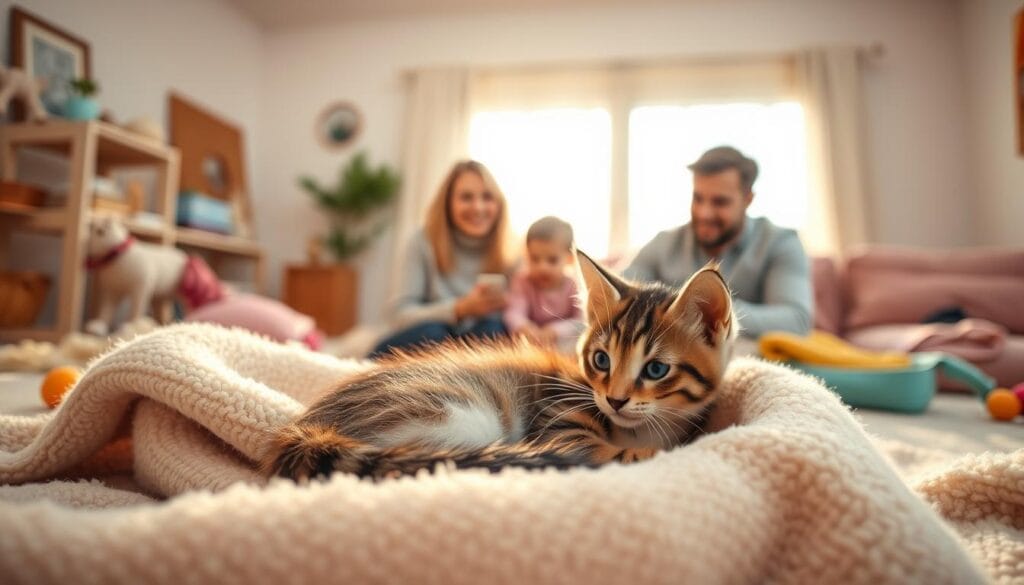
Table of Contents
Are you curious about the magical world of mixed breed kittens? These delightful domestic cats, known as moggies, are a diverse and fascinating group. They bring unique charm to any home.
Mixed breed kittens are extraordinary pets with unpredictable genetic backgrounds. Unlike purebred cats, they offer a unique blend of traits. This makes each kitten truly one-of-a-kind.
Welcoming a mixed breed kitten into your home means embracing a companion with potential health advantages. These resilient felines are the most common type of cat worldwide. They show nature’s incredible ability to create adaptable creatures.
Your future mixed breed kitten promises an exciting journey of discovery and companionship. They will bring unconditional love into your life. Get ready to explore the incredible world of these extraordinary feline friends.
Understanding Mixed Breed Cats: Origins and History
The story of cat domestication is thousands of years old. It’s a tale of survival, adaptation, and friendship with humans. Your mixed breed kitten has a story to tell, one of incredible history.
Cats come from the wild deserts of the Middle East. They first met humans there. Over time, these wild cats became the pets we love today.
Ancient Domestication Origins
Cat domestication began about 12,000 years ago in the Fertile Crescent. Cats were drawn to human settlements for several reasons:
- Abundant rodent populations around grain storage
- Protection from larger predators
- Consistent food sources
Evolution Through the Ages
As humans evolved, so did cats. They became more diverse through natural selection and breeding. This led to the wide range of mixed breeds we have today.
| Region | Estimated Cat Migration Period | Key Characteristics |
|---|---|---|
| Middle East | 12,000 years ago | First domestication site |
| Egypt | 4,000 years ago | Revered as sacred animals |
| Europe | 2,000 years ago | Spread through trade routes |
Global Spread of Mixed Breeds
Maritime trade and human migration spread cats across the globe. Each new place added to their genetic diversity. This created the amazing variety of mixed breed cats we see today.
Knowing your mixed breed kitten’s history is fascinating. It shows the incredible journey of cat domestication. And it highlights the unique genetic makeup of each feline friend.
Physical Characteristics of Mixed Breed Kittens
Mixed breed kittens are a delightful mix of genetic diversity. They offer a wide range of kitten appearances, making each one unique. Their physical traits are a blend of genetics that can surprise and enchant owners.
The coat types of mixed breed kittens vary greatly. You might find kittens with:
- Short, sleek coats that need little grooming
- Luxurious long-haired varieties with fluffy textures
- Medium-length coats with unique patterns
Eye colors in mixed breed kittens are also remarkable. They can have deep copper, brilliant blue, green, or even different colored eyes. As they grow, their eye colors can change, adding to their intrigue.
No two mixed breed kittens look alike due to the genetic lottery. Their body shapes can range from compact and muscular to lean and elegant. Color patterns include:
- Tabby striped designs
- Solid color coats
- Calico and tortoiseshell combinations
- Bi-color and multi-color patterns
Each mixed breed kitten is a living masterpiece of genetic expression. They show the beautiful complexity of feline inheritance.
The Genetic Advantages of Mixed Breed Kittens
Welcoming a mixed breed kitten into your home is like getting a furry friend with special genetic gifts. These kittens often have better health thanks to hybrid vigor. This is a genetic phenomenon that boosts their overall well-being.
Mixed breed cats have a unique genetic edge over purebred cats. Their mixed genes lead to better health and possibly longer lives.
Understanding Genetic Diversity
Genetic diversity gives mixed breed kittens big advantages:
- Less chance of inherited genetic disorders
- Stronger immune systems
- Ability to adapt to new environments
Common Inherited Traits
Mixed breed kittens get a wide range of traits from their mixed genes. These traits include:
- Unique coat patterns and colors
- Different body sizes and shapes
- Strong physical features
“Mixed breed cats are nature’s genetic masterpieces, combining the best traits from multiple lineages.” – Veterinary Genetics Expert
Longevity and Health Factors
The genetic mix in mixed breed kittens often means better health. Hybrid vigor can make their immune systems stronger. This can also lower the risk of certain health problems and lead to longer lives than some purebred cats.
Personality Traits and Temperament
Mixed breed kittens bring a fascinating world of feline personality to your home. Each kitten develops a unique cat temperament that can surprise and delight you. Their kitten behavior emerges from a complex blend of genetic inheritance and early life experiences.
Understanding your mixed breed kitten’s personality requires patience and observation. Some kittens are incredibly social butterflies, while others prefer quiet contemplation. The diversity of their temperaments makes each cat a truly individual companion.
- Playful explorers who love interactive toys
- Cuddly lap cats seeking constant affection
- Independent thinkers with strong personalities
- Curious adventurers who investigate every corner
Genetic diversity plays a significant role in shaping your kitten’s temperament. Mixed breed cats often display remarkable adaptability and resilience. Their varied genetic background can contribute to more balanced and robust personality traits.
Early socialization remains crucial in developing positive kitten behavior. Exposing your young cat to different people, environments, and experiences helps create a well-adjusted, confident companion. Your interactions during the first few months will significantly influence their future personality.
“Every mixed breed kitten is a unique blend of genetic potential and loving care” – Feline Behavior Specialists
Observing and nurturing your kitten’s individual personality ensures a deep, rewarding relationship that will bring joy to both of you for years to come.
Health Considerations for Mixed Breed Kittens
Mixed breed kittens add joy and unique traits to your home. They usually have good health, but knowing their health needs is key. Preventive care is important to keep them happy and healthy.
Mixed breed kittens are often strong, but they still need regular medical care. This helps them stay in top shape.
Common Health Challenges
Even strong mixed breed kittens face health problems:
- Dental disease
- Potential weight management problems
- Urinary tract complications
- Parasitic infections
- Respiratory conditions
Preventive Care Guidelines
Getting your kitten vaccinated and seeing the vet regularly is crucial. Your vet can create a care plan just for your kitten.
Comprehensive Vaccination Schedule
| Age | Recommended Vaccinations | Purpose |
|---|---|---|
| 6-8 weeks | FVRCP | Prevent viral diseases |
| 9-12 weeks | Rabies | Protect against rabies |
| 12-16 weeks | Booster shots | Reinforce immunity |
“Prevention is always better than cure when it comes to kitten health.” – Veterinary Professionals
Knowing about these health issues helps your mixed breed kitten start life right. Regular checks, good food, and vet visits ensure a long, healthy life together.
Essential Care Requirements

Bringing a mixed breed kitten home is an exciting adventure. It requires dedicated kitten care. Your new furry friend needs a comprehensive approach to ensure their health and happiness. Understanding the basics of cat nutrition and creating a nurturing environment will set the foundation for a strong bond.
Proper kitten care starts with establishing a safe and stimulating living space. You’ll want to create an environment that meets both their physical and mental needs. This includes:
- Providing multiple scratching posts
- Setting up cozy sleeping areas
- Offering interactive toys for mental stimulation
- Creating vertical spaces for climbing
Litter box training is a crucial aspect of your kitten’s early development. Choose a quiet, accessible location for the litter box and introduce your kitten to it frequently. Consistency is key in helping them understand where to do their business.
“A well-prepared home is the first step to a happy, healthy kitten.” – Veterinary Experts
Cat nutrition plays a vital role in your kitten’s growth and development. Invest in high-quality kitten-specific food that provides the right balance of nutrients. Young kittens typically need smaller, more frequent meals to support their rapid growth and high energy levels.
- Feed premium kitten food
- Maintain a consistent feeding schedule
- Provide fresh water at all times
- Consult with your veterinarian about nutritional needs
Regular veterinary check-ups, gentle handling, and plenty of love will help your mixed breed kitten thrive. Remember that each kitten is unique, and patience is your greatest tool in providing exceptional care.
Feeding and Nutrition Guidelines
Proper kitten nutrition is key for your mixed breed kitten’s health. They need a special diet for their fast growth and development.
Kittens have different nutritional needs than adult cats. Their food should be high in protein and calories. This supports their quick growth and energy.
Age-Appropriate Diet Choices
Choosing the right cat food for your kitten is important. It depends on their age and growth stage. Here are some tips for picking the right nutrition:
- 0-4 weeks: Mother’s milk or specialized kitten formula
- 4-8 weeks: Gradual introduction of wet kitten food
- 8-12 weeks: Transition to solid kitten-specific meals
- 3-6 months: High-protein kitten food with balanced nutrients
Feeding Schedule Recommendations
Having a regular feeding schedule is important. It helps control your kitten’s metabolism and prevents overeating. Follow these guidelines:
- Feed young kittens 3-4 small meals per day
- Provide fresh water at all times
- Measure portions based on weight and age
- Gradually reduce feeding frequency as they grow
“Nutrition is the foundation of your kitten’s health and future well-being.” – Veterinary Nutrition Expert
Always talk to your vet to make a feeding plan. It should meet your mixed breed kitten’s specific nutritional needs.
Grooming Needs and Maintenance
Cat grooming is key to caring for your mixed breed kitten. Each coat type needs a special care approach. Knowing the basics helps you create a grooming routine that keeps your kitten healthy and happy.
Begin with a regular brushing schedule. Most mixed breed kittens need weekly brushing. This removes loose fur, prevents matting, and lets you check for skin issues.
- Short-haired cats: Brush once a week
- Long-haired cats: Brush 2-3 times per week
- Curly or woolly coats: Daily brushing recommended
Nail trimming is also vital. Most kittens need their nails trimmed every 2-3 weeks. Start early to make the process comfortable for your kitten. Use cat nail clippers and be gentle to avoid stress.
“Gentle, consistent grooming builds trust between you and your kitten” – Veterinary Grooming Experts
Bathing should be minimal for most cats. Mixed breed kittens usually groom themselves. But, occasional baths might be needed for dirty or long-haired cats. Use cat-specific shampoos and warm water for a calm experience.
| Grooming Task | Frequency | Tools Needed |
|---|---|---|
| Brushing | 1-3 times weekly | Soft-bristle brush, slicker brush |
| Nail Trimming | Every 2-3 weeks | Cat nail clippers |
| Bathing | As needed | Cat shampoo, towels |
Remember, every kitten is different. Listen to your cat’s needs and get advice from your vet. Being patient and positive makes grooming a special bonding time for you and your kitten.
Training Your Mixed Breed Kitten
Bringing a new mixed breed kitten home is an exciting adventure. Successful kitten training needs patience, consistency, and knowing about cat behavior. Your training approach will shape your kitten’s growth and strengthen your bond.
Kittens are naturally smart and adaptable, making training fun. By setting clear expectations and using positive reinforcement, you can help your kitten learn good behavior.
Litter Box Training Essentials
Most kittens naturally know how to use a litter box. To help them, follow these important tips:
- Put the litter box in a quiet, easy-to-reach spot
- Use unscented, fine-grain litter
- Clean the box every day to encourage regular use
- Have multiple litter boxes in bigger homes
Effective Behavioral Training Methods
Strategic training techniques can manage cat behavior well:
- Use treats and praise as rewards for good behavior
- Redirect unwanted behaviors with the right toys
- Keep a consistent daily routine
- Practice short, fun training sessions
Remember, every kitten is different. Being patient and understanding will help you through the training process. This will create a harmonious relationship with your mixed breed companion.
Socialization and Environmental Enrichment
Kitten socialization is key to your mixed breed cat’s future. The first weeks are crucial for their personality development. Exposing them to new experiences helps them grow into confident adult cats.
Environmental enrichment is vital for your kitten’s growth. Cat toys and play spaces keep them stimulated and prevent boredom. A dynamic environment supports their mental and physical development.
- Introduce your kitten to different people, sounds, and environments gradually
- Use positive reinforcement during socialization experiences
- Provide a variety of cat toys that encourage exploration and play
- Create vertical spaces like cat trees and scratching posts
When designing enrichment for your kitten, consider these elements:
| Enrichment Type | Benefits | Recommended Age |
|---|---|---|
| Interactive Puzzle Feeders | Mental stimulation, slow feeding | 8-12 weeks |
| Climbing Structures | Physical exercise, territorial exploration | 10-16 weeks |
| Sensory Toys | Cognitive development, sensory engagement | 6-10 weeks |
Every kitten is different. Be patient and consistent in your interactions. By focusing on enrichment, your kitten will grow into a confident, well-adjusted friend.
Mixed Breed Kitten Development Stages
Knowing how kittens grow is key for pet owners. Mixed breed kittens go through a lot in their first year. They start as tiny babies and grow into playful adult cats. Each stage brings new physical and behavioral changes that shape their personality and health.
Your kitten’s growth happens fast, with big milestones along the way. Let’s look at the main developmental phases. This will help you support your kitten’s journey.
Physical Development Milestones
Kittens go through amazing changes in their early months. Here are the key physical development stages:
- Birth to 2 weeks: Eyes closed, completely dependent on mother
- 2-4 weeks: Eyes open, first attempts at walking
- 4-8 weeks: Teething begins, increased mobility
- 8-12 weeks: Rapid growth, coordination improvement
- 3-6 months: Sexual maturation starts
- 6-12 months: Reaches near-adult size
Behavioral Changes Over Time
As your kitten grows, their behavior changes a lot. Knowing these changes helps you care for and train them properly.
| Age Range | Behavioral Characteristics |
|---|---|
| 0-8 weeks | Learning social skills from mother and littermates |
| 8-16 weeks | Exploring environment, developing play skills |
| 4-6 months | Increased independence, testing boundaries |
| 6-12 months | Developing hunting instincts, establishing social hierarchy |
By watching your mixed breed kitten grow, you’ll build a strong bond. You’ll also give them the care they need at each stage.
Adopting a Mixed Breed Kitten

Adopting a kitten from animal shelters and rescue groups is a wonderful way to welcome a new friend. These mixed breed kittens are often overlooked but have a lot of love to give. They can become a beloved part of your family.
Before adopting a kitten, it’s important to prepare. Rescue groups have a process to find the perfect match for each kitten and owner.
- Research local animal shelters in your area
- Schedule a visit to meet available kittens
- Understand the adoption fees and requirements
- Prepare your home for a new kitten
The adoption process includes several steps. Many groups do home visits and ask for detailed applications. This ensures the kitten goes to the right home.
| Adoption Consideration | Details |
|---|---|
| Typical Adoption Fee | $50 – $250 |
| Age of Adopted Kittens | 8-12 weeks |
| Initial Health Check | Included with adoption |
Adopting a mixed breed kitten from a shelter has many benefits. Not only do you save a life, but you also gain a unique companion with a potentially stronger genetic background. Rescue groups work hard to match kittens with families that can provide a loving home.
Remember, patience is important during the adoption process. Take time to get to know different kittens. Choose the one that fits your lifestyle and home best.
Cost Considerations and Initial Setup
Getting a mixed breed kitten means you need to budget for pet care. You’ll spend money on both the start and ongoing costs to keep your kitten happy and healthy.
Before your kitten arrives, think about all the costs. Kitten supplies are a big part of this. They help make your kitten’s new home comfy.
Essential Startup Supplies
- Litter box and cat litter: $30-$50
- Food and water bowls: $10-$25
- Initial food supply: $20-$40
- Scratching post: $25-$50
- Carrier: $30-$60
- Toys and enrichment items: $20-$40
Ongoing Care Expenses
Plan your budget for ongoing costs to keep your kitten healthy.
| Expense Category | Monthly Cost | Annual Estimate |
|---|---|---|
| Premium Cat Food | $30-$50 | $360-$600 |
| Litter | $15-$25 | $180-$300 |
| Veterinary Check-ups | N/A | $200-$400 |
| Preventative Medications | $10-$20 | $120-$240 |
“Responsible pet ownership means planning for both expected and unexpected expenses.” – Veterinary Financial Experts
Pro tip: Save for emergencies. A special savings account for your kitten’s care can help you feel secure.
Knowing these costs ahead of time helps you prepare a loving, financially stable home for your kitten.
Common Myths About Mixed Breed Kittens
Mixed breed cats face many myths that might scare off potential owners. These myths are not true, as science has shown. Knowing the truth about mixed breed kittens helps you choose the right pet.
Here are some common myths about mixed breed cats that are not true:
- Myth: Mixed breed kittens are less intelligent
Reality: Their mixed genes can make them smarter and more adaptable.
- Myth: Mixed breed cats have more health problems
Studies say their varied genes can boost their immune system and lower health risks.
- Myth: Mixed breed kittens are less affectionate
How loving a cat is depends more on its personality and upbringing than its breed.
Vets agree that mixed breed kittens can be just as loving, smart, and healthy as purebreds. Their unique genes often bring special benefits, making them great pets.
“Genetic diversity is a strength, not a weakness in feline companions.” – Dr. Emily Rodriguez, Feline Genetics Specialist
Don’t let myths stop you from getting a mixed breed kitten. They can bring lots of joy and companionship into your life.
Indoor vs Outdoor Living Considerations

Deciding where your mixed breed cat will live is key to their safety and happiness. Indoor cats usually live longer and are healthier than outdoor cats. The place where your cat lives greatly affects their well-being.
Keeping your cat safe is very important. Outdoor cats face dangers like:
- Traffic accidents
- Potential animal attacks
- Exposure to diseases
- Risk of getting lost
- Harmful environmental toxins
Indoor cats have a safer place to live. An interesting indoor space can keep your cat happy and healthy.
| Living Environment | Pros | Cons |
|---|---|---|
| Indoor Cats | Longer lifespan | Limited natural exploration |
| Outdoor Cats | More physical activity | Higher health risks |
If you want to let your indoor cat outside, try supervised outdoor time or a secure catio. These options let your cat enjoy the outdoors safely.
“The best environment for a cat is one that balances security with stimulation.” – Veterinary Experts
Your mixed breed kitten’s home depends on your situation, where you live, and your cat’s personality. Talk to your vet to choose the best home for your cat.
Conclusion
Welcoming a mixed breed kitten into your home is an exciting journey. These pets bring unique personalities and charm, changing your life for the better. Caring for a mixed breed kitten requires dedication, patience, and love.
Understanding their needs helps build a strong bond. Each kitten has special traits that make them stand out. With the right care, you’ll form a deep connection that enriches both your lives.
Being a cat owner means learning and adapting. Mixed breed kittens may surprise you with challenges, but their love makes it all worth it. Early care sets the stage for a happy, healthy companion.
Starting this journey, care for your kitten with an open heart. They will shower you with love, playful moments, and a special bond. This bond goes beyond the usual pet relationship.
FAQ
Are mixed breed kittens healthier than purebred cats?
Yes, mixed breed kittens often have better health. Their mix of genes can help avoid certain health problems. This mix can also make them live longer and be more resilient.
How different can mixed breed kittens look from each other?
Mixed breed kittens can look very different. Their unique mix of genes leads to a wide range of looks. No two are alike, making each kitten special.
Where can I adopt a mixed breed kitten?
You can find mixed breed kittens at local shelters and online. Places like animal shelters and humane societies have kittens waiting for homes.
How much does it cost to care for a mixed breed kitten?
The first costs are 0-
FAQ
Are mixed breed kittens healthier than purebred cats?
Yes, mixed breed kittens often have better health. Their mix of genes can help avoid certain health problems. This mix can also make them live longer and be more resilient.
How different can mixed breed kittens look from each other?
Mixed breed kittens can look very different. Their unique mix of genes leads to a wide range of looks. No two are alike, making each kitten special.
Where can I adopt a mixed breed kitten?
You can find mixed breed kittens at local shelters and online. Places like animal shelters and humane societies have kittens waiting for homes.
How much does it cost to care for a mixed breed kitten?
The first costs are $500-$1,000 for supplies and adoption. Monthly costs are $50-$100 for food and care. Don’t forget vet bills and medical needs.
Do mixed breed kittens require special care?
Mixed breed kittens need the same care as any cat. This includes vet visits, food, grooming, and socialization. Their care depends on their individual needs.
How long do mixed breed kittens typically live?
With good care, mixed breed kittens can live 12-18 years. Their diverse genes can help them live longer and healthier lives.
Are mixed breed kittens good for families with children?
Many mixed breed kittens make great family pets. They can be playful and loving with proper training. Early socialization with kids is important.
What should I feed my mixed breed kitten?
Feed your kitten high-quality food that matches their age. Choose between wet and dry food based on their needs. Always check with your vet for the best diet.
How often should I groom my mixed breed kitten?
Grooming depends on your kitten’s fur. Short-haired ones need weekly brushing, while long-haired ones may need daily. Remember to trim nails and brush teeth too.
Can mixed breed kittens be trained?
Yes, they can! Use positive methods like treats and praise. Start with basic training and gradually add more commands. Be patient and consistent for best results.
,000 for supplies and adoption. Monthly costs are -0 for food and care. Don’t forget vet bills and medical needs.
Do mixed breed kittens require special care?
Mixed breed kittens need the same care as any cat. This includes vet visits, food, grooming, and socialization. Their care depends on their individual needs.
How long do mixed breed kittens typically live?
With good care, mixed breed kittens can live 12-18 years. Their diverse genes can help them live longer and healthier lives.
Are mixed breed kittens good for families with children?
Many mixed breed kittens make great family pets. They can be playful and loving with proper training. Early socialization with kids is important.
What should I feed my mixed breed kitten?
Feed your kitten high-quality food that matches their age. Choose between wet and dry food based on their needs. Always check with your vet for the best diet.
How often should I groom my mixed breed kitten?
Grooming depends on your kitten’s fur. Short-haired ones need weekly brushing, while long-haired ones may need daily. Remember to trim nails and brush teeth too.
Can mixed breed kittens be trained?
Yes, they can! Use positive methods like treats and praise. Start with basic training and gradually add more commands. Be patient and consistent for best results.







